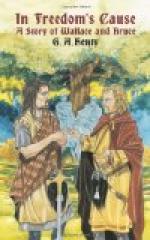The Scots took up their station upon the high ground north of the Forth, protected from observation by the precipitous hill immediately behind Cambuskenneth Abbey and known as the Abbey Craig. In a bend of the river, opposite the Abbey Craig, stood the bridge by which the English army were preparing to cross. Archie stood beside Wallace on the top of the craig, looking at the English array.
“It is a fair sight,” he said; “the great camp, with its pavilions, its banners, and pennons, lying there in the valley, with the old castle rising on the lofty rock behind them. It is a pity that such a sight should bode evil to Scotland.”
“Yes,” Wallace said; “I would that the camp lay where it is, but that the pennons and banners were those of Scotland’s nobles, and that the royal lions floated over Surrey’s tent. Truly that were a sight which would glad a Scot’s heart. When shall we see ought like it? However, Archie,” he went on in a lighter tone, “methinks that that will be a rare camp to plunder.”
Archie laughed. “One must kill the lion before one talks of dividing his skin,” he said; “and truly it seems well nigh impossible that such a following as yours, true Scots and brave men though they be, yet altogether undisciplined and new to war, should be able to bear the brunt of such a battle.”
“You are thinking of Dunbar,” Wallace said; “and did we fight in such a field our chances would be poor; but with that broad river in front and but a narrow bridge for access, methinks that we can render an account of them.”
“God grant it be so!” Archie replied; “but I shall be right glad when the day is over.”
Three days before the battle the Steward of Scotland, the Earl of Lennox, and others of the Scotch magnates entered Surrey’s camp and begged that he would not attack until they tried to induce the people to lay down their arms. They returned, however, on the third day saying that they would not listen to them, but that the next day they would, themselves, join his army with their men-at-arms. On leaving the camp that evening the Scotch nobles, riding homeward, had a broil with some English soldiers, of whom one was wounded by the Earl of Lennox. News being brought to Surrey, he resolved to wait no longer, but gave orders that the assault should take place on the following morning. At daybreak of the 11th of September, 1297, one of the outposts woke Wallace with the news that the English were crossing the bridge. The troops were at once got under arms, and were eager to rush down to commence the battle, but Wallace restrained them. Five thousand Welsh foot soldiers crossed the bridge, then there was a pause, and none were seen following them. “Were we to charge down now, Sir William,” Archie said, “surely we might destroy that body before aid could come to them.”
“We could do, Archie, as you say,” Wallace replied, “but such a success would be of little worth, nay, would harm rather than benefit us, for Surrey, learning that we are not altogether to be despised, as he now believes, would be more prudent in future and would keep his army in the flat country, where we could do nought against it. No, to win much one must risk much, and we must wait until half Surrey’s army is across before we venture down against them.”




